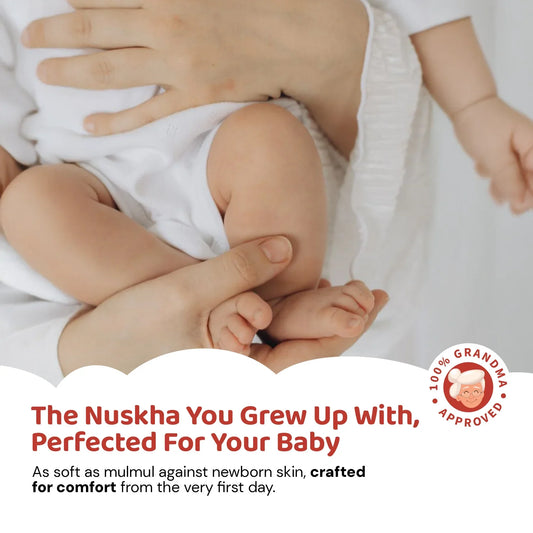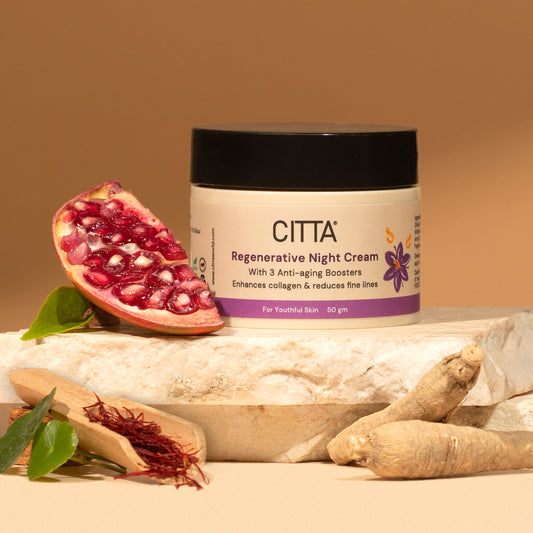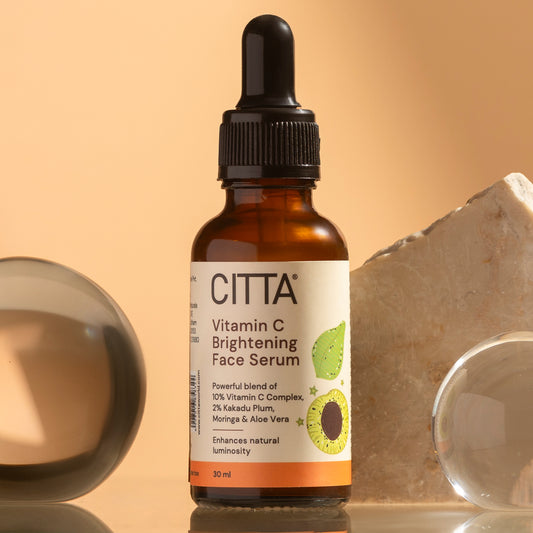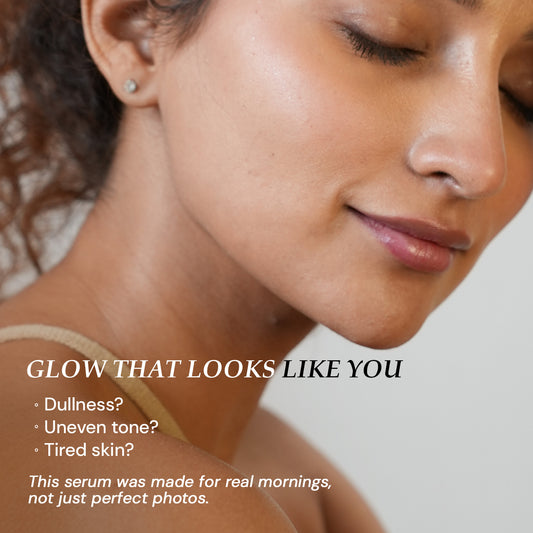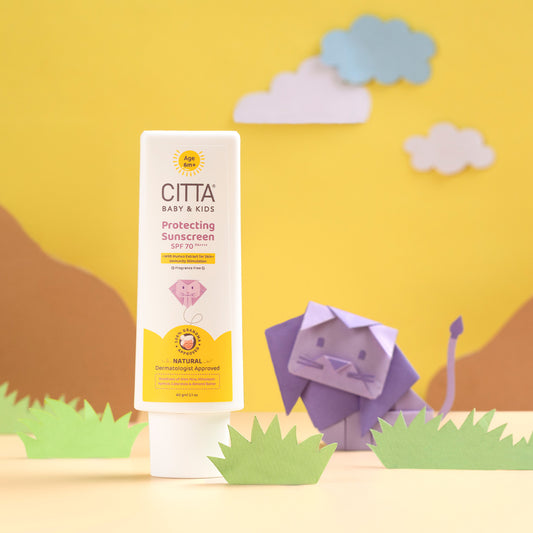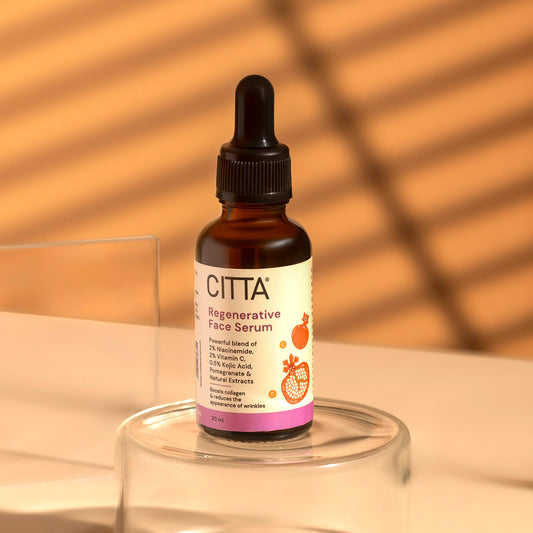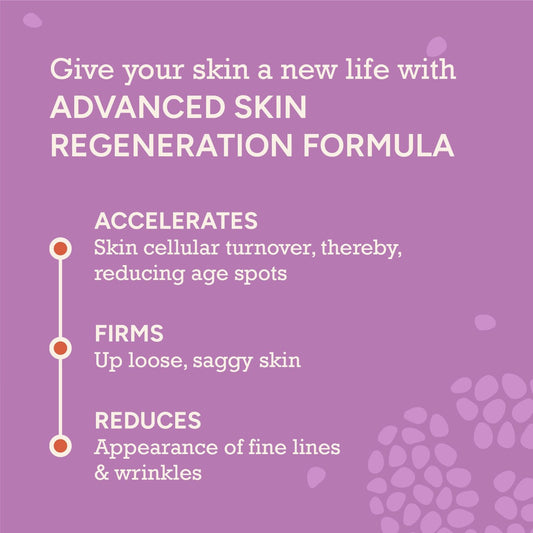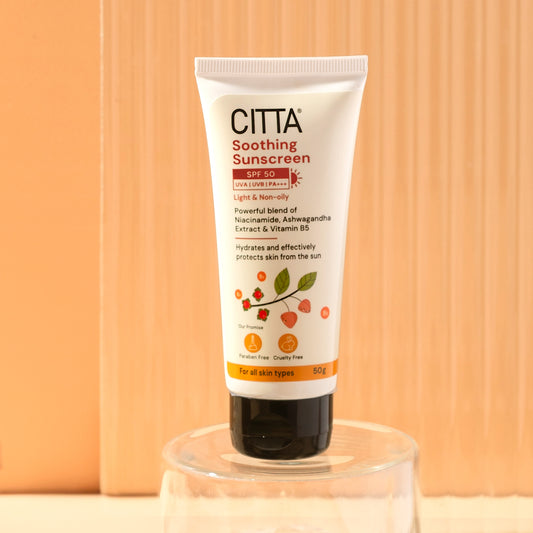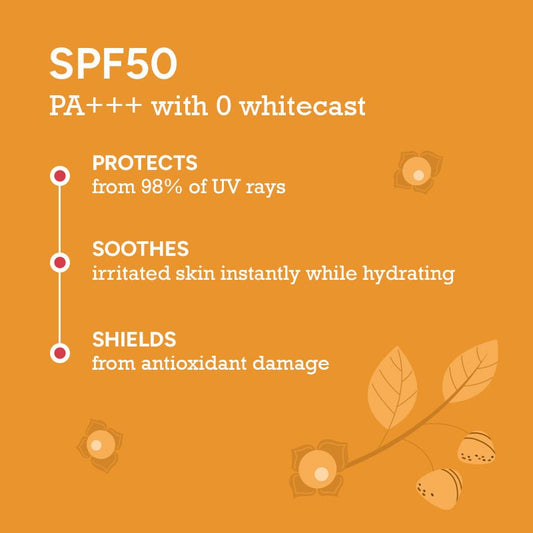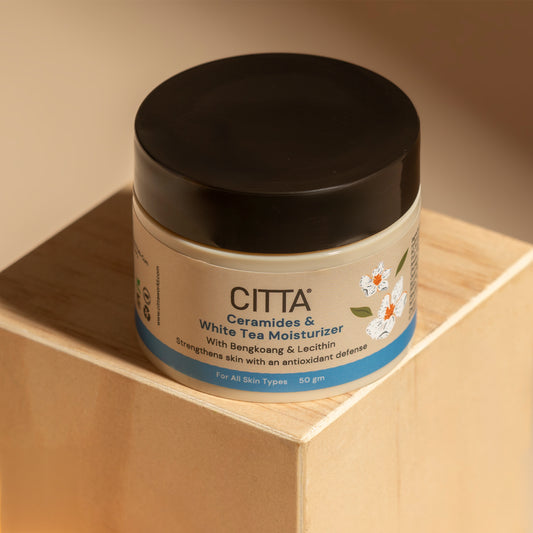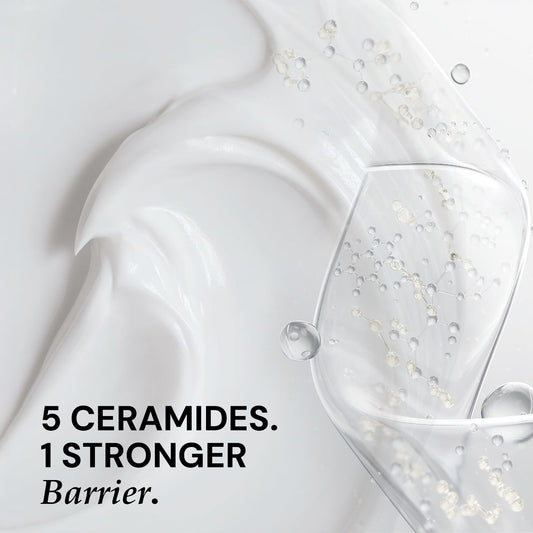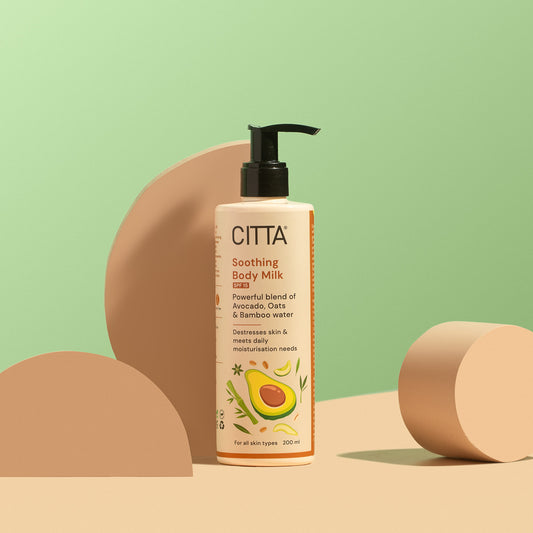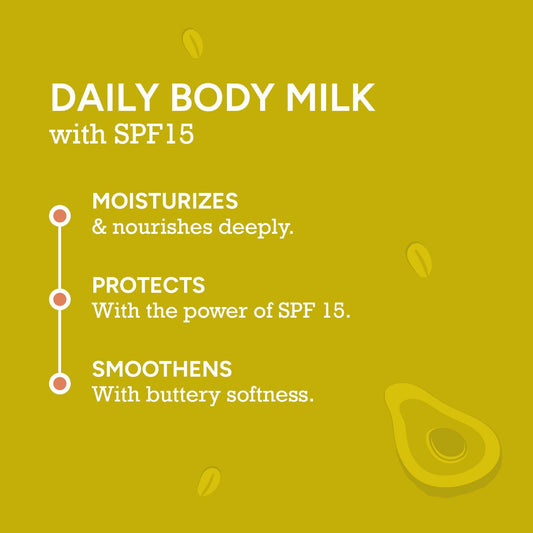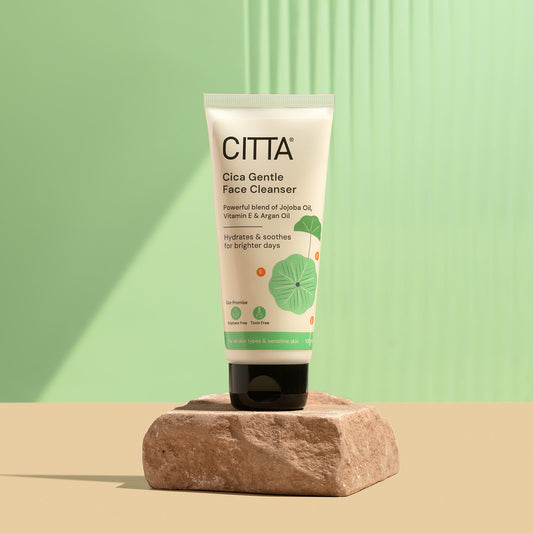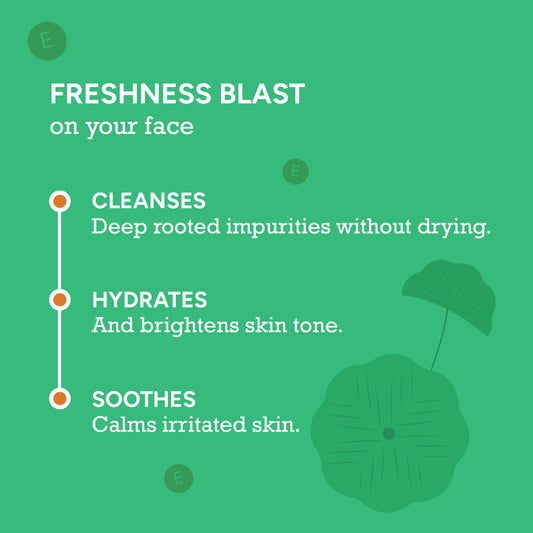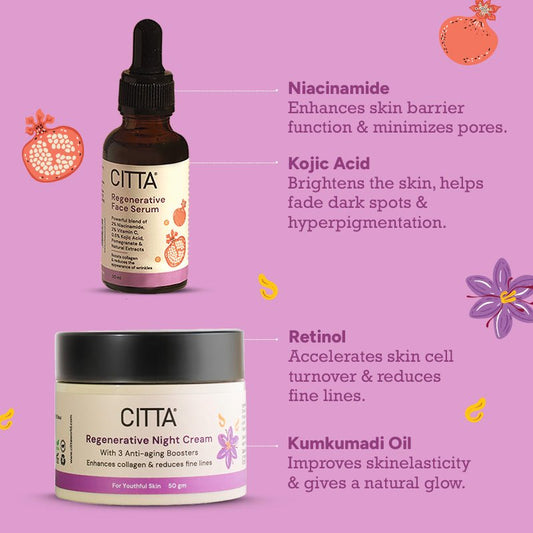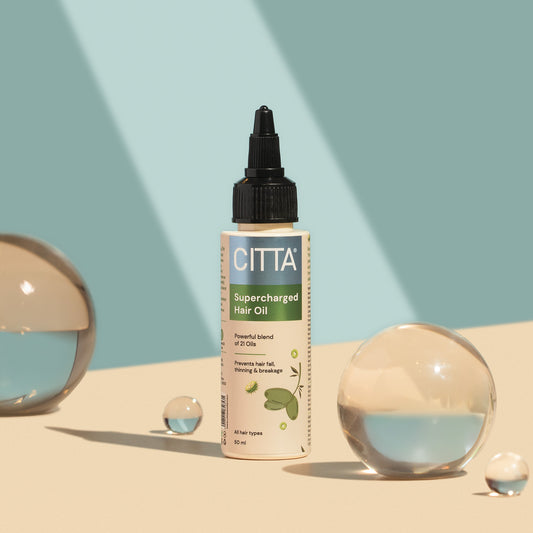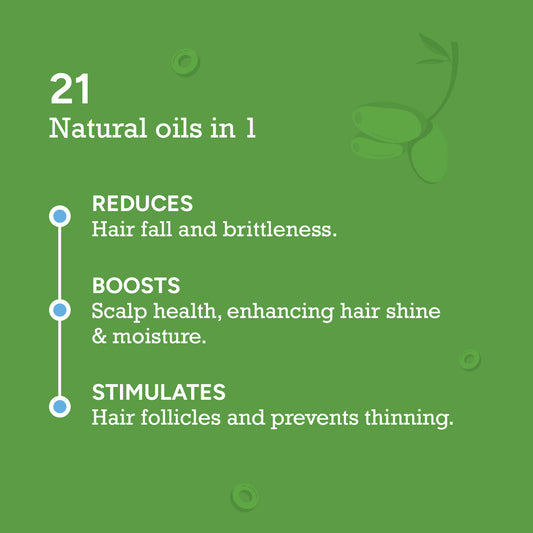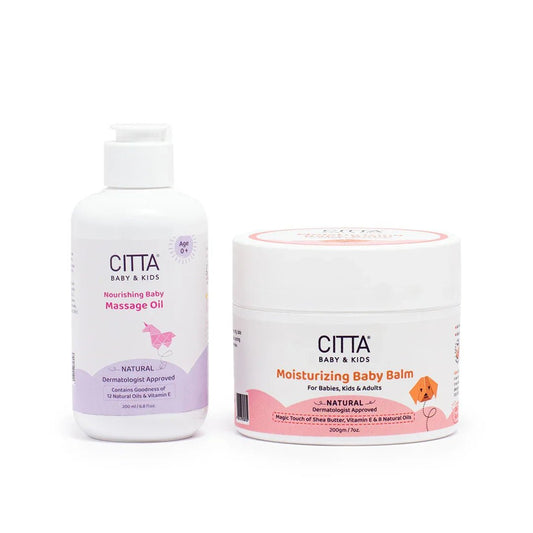The CITTA Promise, Safety First
Toxin Free
Sulphate (SLS/SLES) Free
No Harsh Chemicals
Mineral oil-free
Paraben Free
Natural
Allergen-Free
IFRA Certified Fragrance
Our Bestsellers
-
Natural Baby Moisturizer Balm for Dry, Sensitive Skin
India’s first-ever ‘moisturizing baby balm’ | Heavy-duty moisturizer | Fights dryness & flakiness | For dry, very dry & flaky skin
75 reviewsRegular price Rs. 1,099Regular priceUnit price / perRs. 1,099Sale price Rs. 1,099Regenerative Retinol Night Cream with Kumkumadi & Cica | Anti-Aging & Brightening
Reduces lLines, Wrinkles|Firms Skin|Revives Glow
22 reviewsRegular price Rs. 749Regular priceUnit price / perRs. 0Sale price Rs. 74912% Vitamin C Serum | With Hyaluronic Acid for Brightening & Pigmentation
Triple brightening / Boosts collagen / Evens skin
14 reviewsRegular price Rs. 549Regular priceUnit price / perRs. 0Sale price Rs. 549SPF 70 PA++++ Sunscreen Lotion for Babies & Kids
Protects against UVA & UVB rays | Prevents sunburns | Intensely moisturizes | Stimulates skin immunity
20 reviewsRegular price Rs. 849Regular priceUnit price / perRs. 849Sale price Rs. 849Skin Care (New Launch)
-
Regenerative Retinol Night Cream with Kumkumadi & Cica | Anti-Aging & Brightening
Reduces lLines, Wrinkles|Firms Skin|Revives Glow
22 reviewsRegular price Rs. 749Regular priceUnit price / perRs. 0Sale price Rs. 749Anti Aging Face Serum – With Kojic Acid, Niacinamide & Vitamin C for Glow, Firmness & Youthful Skin
Reduces wrinkles / Firms skin / Revives dullness
6 reviewsRegular price Rs. 549Regular priceUnit price / perRs. 0Sale price Rs. 549Soothing Sunscreen SPF 50 PA+++ | With Niacinamide & Hyaluronic Acid | No White Cast – For Dry and Sensitive Skin
SPF 50 PA+++ | No White Cast | Non-Sticky
7 reviewsRegular price Rs. 579Regular priceUnit price / perRs. 0Sale price Rs. 579Ceramides & White Tea Moisturiser | Barrier Repair with 5 Ceramides + Natural Glow Boost
Repair's Skin Barrier | Deep Moisturization | Rich Antioxidant Protection |
14 reviewsRegular price Rs. 629Regular priceUnit price / perRs. 0Sale price Rs. 629Soothing Body Milk with SPF | Lightweight Body Lotion for Summer Hydration
Daily Moisturization | SPF 15 | Smooth & Soft skin
11 reviewsRegular price Rs. 319Regular priceUnit price / perRs. 0Sale price Rs. 319Gentle Face Wash for Sensitive Skin | Cica Face Cleanser
Gently Cleanses / Brightens, Soothes Skin / Non-drying
9 reviewsRegular price Rs. 449Regular priceUnit price / perRs. 0Sale price Rs. 449CITTA Regenerative Face Serum & Night Cream Combo
Reduces fine lines | Firms skin | Fades dark spots & hyperpigmentation
9 reviewsRegular price Rs. 973Regular priceUnit price / perRs. 1,298Sale price Rs. 9731 / of 7

Why Choose CITTA?
At CITTA, we’ve got everything your little one’s skin could ever need
And then some!
Safety? Absolutely.
100% transparency? You bet.
Innovative skincare solutions? Of course!
And the best part? Everything we do is rooted in dadi nani ke nuskhe, those time-tested remedies passed down through generations which are tested and approved by dermatologists. read more







Most-Loved Baby Must-Haves!

-
12% Vitamin C Serum | With Hyaluronic Acid for Brightening & Pigmentation
Triple brightening / Boosts collagen / Evens skin
14 reviewsRegular price Rs. 549Regular priceUnit price / perRs. 0Sale price Rs. 54921-in-1 Supercharged Hair Oil | Amla, Bhringraj & Olive for Hair Growth & Hair Fall Control – with Scalp Applicator
Strengthens & repairs | Promotes growth | Boosts scalp health
8 reviewsRegular price Rs. 293Regular priceUnit price / perRs. 0Sale price Rs. 293All-Rounder Winter Care Duo
12 reviewsRegular price Rs. 1,499Regular priceUnit price / perRs. 1,999Sale price Rs. 1,499Anti Aging Face Serum – With Kojic Acid, Niacinamide & Vitamin C for Glow, Firmness & Youthful Skin
Reduces wrinkles / Firms skin / Revives dullness
6 reviewsRegular price Rs. 549Regular priceUnit price / perRs. 0Sale price Rs. 549Whispers of a Mother’s Heart
"My daughter has been using CITTA since birth, and now there is no going back. The moisturising baby balm has been more than perfect for us. This is a must-have product if your baby has dry skin and rashes."

Smita P.
"To all the moms out there, I would highly recommend this product as it keeps my baby's skin supple and retains moisture, even after the bath. My girl's Paediatrician has also suggested continuing with other CITTA products."

Ananya N.
"It has all the oils like sesame, olive, coconut, almond, etc, I am happy as it helps in nourishment, is non-sticky free from fragrance. Love this.."

Rohini G.
This baby bath set prevents dryness and irritation and cleanse gently. Nice product

Nayan T.
Buzz Worth Talking About








From Our Experts to You
Read MoreTrusted Insights and Tips to Nurture Your Baby’s Growth and Happiness
 February 9, 2024
February 9, 2024
The Delicate Balance of Children's Skin: Why Adult Skincare Isn't Suitable
Read More February 9, 2024
February 9, 2024
The Delicate Balance of Children's Skin: Why Adult Skincare Isn't Suitable
Read More February 9, 2024
February 9, 2024
The Delicate Balance of Children's Skin: Why Adult Skincare Isn't Suitable
Read MoreAlso Available at





Parenting Wisdom 101
-

Baby Skin Care Tips Every New Parent Should Know
There’s nothing softer, purer, or more precious than your baby’s skin. But that also means it’s more delicate and vulnerable - to dryness, rashes, and irritation. As new parents, you...
1 commentBaby Skin Care Tips Every New Parent Should Know
There’s nothing softer, purer, or more precious than your baby’s skin. But that also means it’s more delicate and vulnerable - to dryness, rashes, and irritation. As new parents, you want to give your baby the gentlest care possible - something safe, effective, and inspired by the wisdom of generations. At CITTA, we believe that baby skincare should be a mindful ritual - rooted in dadi-nani ke nuskhe, yet perfected with modern dermatological science. Here’s your dermatologist-approved guide to understanding, protecting, and nourishing your little one’s skin naturally. 1. Understand Your Baby’s Skin A newborn’s skin is thinner and more sensitive than an adult’s, making it prone to dryness and irritation. Their skin barrier is still developing, so using gentle, chemical-free, and pH-balanced products is essential. CITTA Tip: Choose products that are free from parabens, sulfates, silicones, and synthetic fragrances.Try: CITTA Natural Foaming Baby Wash - made with Coconut Oil, Aloe Vera, and Rice Protein, this gentle cleanser maintains skin’s natural pH while preventing rashes and dryness. 2. Moisturize Daily - The Secret to Rash-Free, Baby-Soft Skin Moisturizing is the most crucial baby skin care step. A rich, oil-based formula helps lock in hydration and strengthen the skin barrier. CITTA Tip: Always apply moisturizer right after bathing to seal in moisture.Try: CITTA Natural Moisturizing Baby Balm - a luxurious blend of 7 natural oils, Shea Butter, and Vitamin E that keeps your baby’s skin soft, rash-free, and nourished all day. 3. Choose the Right Bath Routine Your baby’s skin is delicate and loses moisture quickly. Keep bath time short - around 5 to 10 minutes, and use only lukewarm water. Avoid strong soaps or bubble baths that can dry out the skin. Instead, choose a gentle, pH-balanced baby wash like CITTA Gentle Foaming Baby Wash to cleanse while maintaining your baby’s natural oils. 4. Prevent Diaper Rashes Naturally The diaper area stays warm and moist, making it prone to rashes and irritation. To keep your baby comfortable, change diapers frequently, gently clean the area, allow diaper-free time daily, and apply a soothing, protective cream like CITTA Diaper Rash Cream to prevent redness, dryness, and discomfort while nourishing delicate skin. 5. Protect from Environmental Stressors Dust, pollution, and sun exposure can easily irritate your baby’s sensitive skin. Keep your baby indoors during peak sun hours and always use breathable, cotton clothing. CITTA Tip: For outdoor time, apply a gentle baby-safe sunscreen.Try: CITTA Protecting Baby Sunscreen SPF 70 PA+++, crafted with Zinc Oxide, Aloe Vera, and Shea Butter, it provides safe, non-sticky sun protection for delicate skin. 6. Massage for Healthy Skin & Better Sleep Baby massages are more than just bonding moments, they play a crucial role in improving blood circulation, strengthening muscles, and promoting better sleep. Regular gentle massages with nourishing oils like coconut or almond oil also help keep your baby’s skin soft, supple, and healthy. CITTA Tip: Warm the oil slightly before massage and use gentle, circular motions.Try: CITTA Nourishing Baby Massage Oil - enriched with Coconut, Almond, and Turmeric oils, this traditional blend improves circulation, promotes relaxation, and strengthens the skin’s natural barrier. 7. Keep Your Baby Hydrated (Inside & Out) Even though babies get most of their hydration from milk, their skin needs external hydration support too - especially during dry seasons. Use a natural face mist or moisturizer throughout the day if the skin feels dry. Try: CITTA Hydrating Face Mist with Rose & Aloe Vera - safe for babies and adults alike, this gentle mist instantly refreshes and soothes the skin. 8. Patch Test Every New Product Even natural ingredients can cause reactions if your baby’s skin is sensitive to them. Always do a small patch test on your baby’s inner arm or thigh before applying any new product all over. Because WHY NOT? Give Your Baby the Care They Deserve At CITTA, we’ve got everything your little one’s skin could ever need, and then some!Safety? Absolutely.100% transparency? You bet.Dermatologist-tested and inspired by grandma’s wisdom - that’s the CITTA way. When you choose CITTA, you’re not just choosing skincare; you’re choosing mindful care backed by love, science, and generations of trust. FAQs 1. What are the most important baby skin care tips for newborns? Keep baths short, use mild cleansers, moisturize daily, and protect from harsh sunlight and rashes. 2. Which baby skincare products are best for sensitive skin? Use dermatologist-tested products like CITTA Baby Balm, CITTA Baby Wash, and CITTA Baby Massage Oil - all made from natural, chemical-free ingredients. 3. How often should I bathe my newborn? 3–4 times a week is enough for newborns. Over-bathing can cause dryness. 4. Can I use regular lotion on my baby? No. Baby skin is more delicate, so always use a product specifically formulated for babies, like CITTA Moisturizing Baby Balm. 5. How can I prevent diaper rashes? Keep the area clean and dry, change diapers often, and apply CITTA’s Natural Baby Balm after every change. 6. Are natural or Ayurvedic baby products safe? Yes, as long as they’re dermatologically tested and free from harmful chemicals. CITTA blends Ayurveda with science to ensure safety. 7. Can I use baby products on my own skin? Absolutely! CITTA’s baby range is gentle, nourishing, and perfect for adults with sensitive skin too. 8. When should I start using baby skincare products? You can begin from day one, as long as the products are safe, natural, and dermatologist-approved, like CITTA’s newborn-safe range.
Read More1 comment -

Castor Oil vs Coconut Oil for Baby Massage – Wh...
In every Indian household, baby massage is more than just a daily ritual; it’s an age-old tradition rooted in love and wisdom. From dadi-nani ke nuskhe (grandmother’s tips) to modern...
1 commentCastor Oil vs Coconut Oil for Baby Massage – Which Is Better?
In every Indian household, baby massage is more than just a daily ritual; it’s an age-old tradition rooted in love and wisdom. From dadi-nani ke nuskhe (grandmother’s tips) to modern dermatologists’ recommendations, parents have always looked for the best oil for newborn massage that keeps their baby’s skin soft, strong, and healthy. Among the many choices, two oils always spark debate: castor oil for baby massage and coconut oil for baby massage. Both are trusted, both are natural, but which one is truly better for your little one? Let’s dive in. Why Baby Massage Matters In India, baby massage is not just skincare; it’s an emotional bonding experience. Traditionally done every morning, it is believed to: Strengthen muscles and bones Improve blood circulation Aid digestion and sleep Nourish and protect delicate skin And of course, the choice of oil makes all the difference. Coconut Oil for Baby Massage Coconut oil is one of the most commonly recommended oils for baby massage, especially in tropical climates. Benefits of Coconut Oil for Baby Massage: Light & Non-Sticky: Quickly absorbed by delicate skin, making it ideal for daily use. Cooling Effect: Naturally soothes the skin, perfect for summers or hot weather. Skin Protection: Its antimicrobial properties help reduce the chances of skin infections. Hair & Scalp Care: Helps reduce dryness and keeps the scalp nourished. Gentle on Sensitive Skin: Less greasy, making it a favorite among parents worldwide. However, coconut oil may not provide enough nourishment in harsh winters when skin tends to get extra dry. Castor Oil for Baby Massage Castor oil has been trusted for generations, especially during winter or when babies have dry skin. Benefits of Castor Oil for Baby Massage: Deep Nourishment: Rich in fatty acids that moisturize deeply. Strengthens Muscles & Bones: A popular choice in traditional massage routines. Soothes Irritation: Known for its anti-inflammatory properties. Hair Growth Support: Helps strengthen roots and promote healthy hair. But unlike coconut oil, castor oil is thicker and stickier, which may feel heavy during hot or humid weather. If you’d like to explore more about castor oil’s skin benefits, check our detailed guide: 5 Surprising Benefits of Using Castor Oil for Baby Skin Care. Castor Oil vs Coconut Oil – The Key Difference When deciding between castor oil and coconut oil for baby massage, the difference lies in texture, climate suitability, absorption, and specific skin needs. Texture: Coconut oil has a light and smooth consistency, making it easy to spread and massage into your baby’s skin without leaving residue. Castor oil, on the other hand, is thicker and denser, giving a richer, more protective layer on the skin. This makes castor oil especially beneficial for babies with dry or flaky skin. Climate Use: Coconut oil naturally provides a cooling effect, which is why it is the go-to choice for hot and humid climates. It keeps the skin fresh and non-sticky even during summer. Castor oil works best in cold or dry climates because its heavier texture helps lock in moisture and prevent the skin from drying out in the winter months. Absorption: Coconut oil is known for its fast absorption, quickly sinking into the skin without greasiness. This makes it ideal for daily massages, even if you’re short on time. Castor oil, however, takes longer to absorb, but in return, it offers deep moisturization that lasts longer, creating a protective barrier against dryness. Skin Concerns: Coconut oil is more suited for normal to sensitive skin types, thanks to its gentle, soothing, and antimicrobial nature. Castor oil is best for babies with very dry, rough, or flaky patches, as it delivers intense hydration and helps calm irritation. In short: Choose coconut oil if you want a lightweight, cooling, and quick-absorbing option for everyday massage, especially in warmer weather. Choose castor oil if your baby needs deep nourishment, extra hydration, or lives in a colder, drier region. A Thoughtful Alternative – Why Choose One When You Can Have Both? Instead of choosing between the two, many parents prefer a balanced oil that combines the goodness of castor oil, coconut oil, and other natural oils. That’s exactly what you get with CITTA Natural Nourishing Baby Massage Oil. Why Parents Love CITTA: 12 Oils in 1 Blend – Includes Castor oil, Coconut oil, Almond, Sesame, Olive, Sunflower, Ashwagandha, Turmeric, Basil, Brahmi, Cinnamon & Camphor oils. Lightweight yet Nourishing – Absorbs easily without feeling sticky. Season-Friendly – Works equally well in summer and winter. Safe for Babies – Dermatologist-tested, toxin-free, cruelty-free, and allergen-free. Multi-Purpose – Can be used on both skin and hair. With CITTA, you don’t have to worry about choosing; you give your baby the balanced nourishment of both oils in one safe, modern, and effective formula. Add to cart Conclusion When it comes to castor oil vs coconut oil for baby massage, there’s no one-size-fits-all answer. Both are treasures of Indian tradition, each offering unique benefits. But for today’s parents who want safety, nourishment, and convenience in one, CITTA Baby Massage Oil brings the perfect solution, a thoughtful blend of 12 natural oils, inspired by dadi-nani’s nuskhe, designed for modern parenting. Because when it comes to your baby’s skin, why settle for one when you can have it all? FAQs 1. Which is better for newborn massage, coconut oil or castor oil? Coconut oil is lighter, making it more suitable for newborns. Castor oil can be used occasionally in winter for extra nourishment. 2. Can I mix castor oil and coconut oil at home? Yes, but getting the right balance and purity can be tricky. A pre-formulated blend like CITTA Baby Massage Oil ensures safety and consistency. 3. Is coconut oil enough for dry baby skin? It works for mild dryness, but for very dry skin, castor oil or a multi-oil blend is better. 4. Can castor oil be used in summer? It’s safe but may feel heavy on your baby’s skin in hot weather. Coconut oil or a lightweight blend is preferable. 5. What’s the best oil overall for baby massage? A dermatologist-approved blend that combines coconut, castor, and other nourishing oils, like CITTA Natural Nourishing Baby Massage Oil, offers complete care.
Read More1 comment -

Natural Moisturizer for Baby Dry Skin: What Eve...
As parents, we understand how delicate and soft our baby’s skin is. However, it is also more likely to experience dryness, flakiness, and irritation, especially during seasonal changes, frequent baths,...
Natural Moisturizer for Baby Dry Skin: What Every Parent Should Know Before Buying
As parents, we understand how delicate and soft our baby’s skin is. However, it is also more likely to experience dryness, flakiness, and irritation, especially during seasonal changes, frequent baths, or exposure to pollution. Finding the best natural moisturizer for a baby's dry skin is not just about skincare; it is about protecting their health and comfort. With so many options available, how do you choose the right natural moisturizer for your baby's dry skin? Let’s break it down for you with everything you need to know before making that purchase. Why Does Your Baby’s Skin Need a Natural Moisturizer? Unlike adult skin, your baby’s skin is up to 30% thinner and far more delicate. This means it loses moisture at a much faster rate and doesn’t have the same natural oils or resilience to protect itself from the environment. That’s why even small changes, like a slightly cooler bath, exposure to wind, or spending a few hours in air-conditioning, can leave their skin feeling dry, itchy, or irritated. A good baby moisturizer plays a crucial role in daily care: Restores lost hydration after baths: Bathing often strips away natural oils. A moisturizer helps replenish this lost hydration and prevents the skin from drying out. Strengthens the skin’s natural barrier: Babies are still developing their protective skin barrier. Moisturizers enriched with natural butters and oils create a shield against external irritants. Prevents flakiness, rough patches, and redness: Without moisture, baby skin can quickly become rough or patchy. Regular moisturization helps keep it smooth and irritation-free. Keeps skin soft, supple, and healthy all day long: Hydrated skin is not only comfortable but also better protected against rashes, eczema, or environmental triggers like pollution and seasonal dryness. This is why choosing a natural moisturizer for a baby's dry skin is so important. Unlike chemical-heavy products, natural formulations are gentle, toxin-free, and safe for everyday use, ensuring that nothing harsh touches your baby’s sensitive skin. Discover CITTA’s Moisturizing Baby Balm - enriched with nourishing natural butters and oils, designed especially to protect and comfort delicate baby skin. Key Ingredients to Look For in the Best Natural Moisturizer for Baby Dry Skin When selecting a moisturizer for kids, ingredients matter more than fancy packaging. Look for: Shea Butter & Cocoa Butter: Deeply hydrating natural butters that keep skin soft. Coconut Oil & Sunflower Oil: Gentle oils that restore skin moisture without greasiness. Oat Kernel Extract: Soothes irritation and calms redness. Chamomile: Known for its anti-inflammatory and healing properties. Vitamin E: Helps protect delicate skin from dryness and oxidative stress. These ingredients make a baby balm not only nourishing but also safe for daily use. Why CITTA’s Moisturizing Baby Balm is the Best Choice At CITTA, we believe baby skincare should be safe, effective, and rooted in dadi-nani ke nuskhe blended with modern science. Our Moisturizing Baby Balm is specially formulated to be the best baby moisturizer for dry skin. What makes it unique? Natural & toxin-free: Free from parabens, silicones, and harsh chemicals. Dermatologist-tested & safe: Suitable for newborns, toddlers, and kids up to 10 years. Deep hydration: Works as a moisturizing balm that keeps skin nourished all day long. Multi-purpose use: Perfect for face, hands, knees, and any dry patches. This gentle yet effective moisturizer for kids ensures your baby’s skin stays soft, happy, and protected every single day. Add to cart How to Use a Natural Moisturizer for Baby Dry Skin After Bath: Apply the baby moisturizer immediately after drying the skin to lock in moisture. Before Bedtime: Massage gently with the moisturizing balm to keep skin nourished overnight. Focus on Dry Areas: Pay extra attention to elbows, knees, and cheeks that dry out faster. Daily Use: Consistency is key to preventing dryness. Final Thoughts Choosing the best natural moisturizer for a baby's dry skin doesn’t have to be hard. Look for products that are safe, natural, dermatologist-tested, and made for delicate skin. With CITTA’s Baby Balm, you get the perfect mix of tradition and science, crafted to keep your little one’s skin soft, hydrated, and healthy. Try CITTA Moisturizing Baby Balm today and give your baby’s skin the gentle care it deserves. FAQs 1. Can I use a natural moisturizer for my newborn’s dry skin? Yes, a safe and dermatologist-tested baby moisturizer can be used even on newborns. Always choose a formula free from harsh chemicals and artificial fragrances. 2. How often should I apply moisturizer to my baby? At least twice a day, once after a bath and once before bedtime. You can reapply on very dry patches whenever needed. 3. What is better for the baby's skin, lotion or moisturizing balm? A moisturizing balm is thicker and more nourishing, making it ideal for dry skin. Lotions are lighter but may not be enough for persistent dryness. 4. Can I use adult moisturizers on my baby? No. Adult products often contain strong fragrances and harsh ingredients that can irritate delicate baby skin. Always opt for a specially formulated moisturizer for kids. 5. What makes CITTA’s Baby Balm different from other baby moisturizers? Our CITTA Baby Balm combines grandma’s wisdom with modern dermatology, offering safe, toxin-free, and effective hydration for dry, sensitive skin.
Read More
Glow Guide: Expert Tips & Insights
-

How to Use Anti Dandruff Shampoo the Right Way ...
Dandruff is one of those scalp issues that feels simple, but isn’t.Most people own an anti dandruff shampoo, yet dandruff keeps coming back. The flakes reduce for a few days…...
How to Use Anti Dandruff Shampoo the Right Way (Most People Get This Wrong)
Dandruff is one of those scalp issues that feels simple, but isn’t.Most people own an anti dandruff shampoo, yet dandruff keeps coming back. The flakes reduce for a few days… then return, sometimes worse than before. The problem?👉 Not the shampoo. It’s how you use anti dandruff shampoo. At CITTA, we believe scalp care should be mindful, transparent, and effective, just like dadi nani ke nuskhe, backed by dermatology. This guide breaks down how to use anti dandruff shampoo correctly, the mistakes most people make, and how to build a routine that actually works. What Is Dandruff & Why It Keeps Coming Back? Dandruff is not just “dry scalp.” It is often caused by: Overgrowth of Malassezia yeast Excess oil on the scalp Irregular cleansing Product build-up Stress, hormonal imbalance & lifestyle factors When dandruff is treated only on the surface, flakes return. The solution lies in correct usage, not aggressive washing. How to Use Anti-Dandruff Shampoo the Right Way (Step-by-Step) Step 1: Oil Your Hair (Yes, This Matters) Contrary to popular belief, oiling before washing does not worsen dandruff, if done right. Use a lightweight, scalp-friendly oil 30–45 minutes before shampooing. This helps: Loosen flakes Reduce inflammation Prevent post-wash dryness A balanced oil like hair growth oil, enriched with traditional herbs, supports scalp health without clogging pores. Avoid overnight oiling when dandruff is active. Also Read: Hair Oiling Mistakes You Didn’t Know Were Causing More Hair Fall Step 2: Apply Shampoo Only on the Scalp (Not Hair Lengths) This is where most people go wrong. Anti dandruff shampoo is a scalp treatment, not a hair cleanser. Correct method: Wet hair thoroughly Take a coin-sized amount Apply directly to the scalp Massage gently with fingertips (no nails) Let the foam cleanse hair lengths while rinsing, do not scrub ends. Step 3: Leave It On (This Is Not a Regular Shampoo) Rinsing immediately reduces effectiveness. ✔ Leave anti dandruff shampoo on the scalp for 2–3 minutesThis allows active ingredients to: Control fungal growth Calm irritation Reduce flaking at the root A gentle yet effective formula like Anti Dandruff Shampoo works best when given time, not friction. Add to cart Step 4: Rinse Thoroughly (Residue = More Flakes) Incomplete rinsing leaves behind residue that can: Trigger itching Cause product build-up Make dandruff reappear faster Use lukewarm water and rinse until scalp feels clean, not squeaky. Step 5: Conditioner Only on Hair Lengths Never apply conditioner to the scalp during dandruff treatment. Apply from mid-lengths to ends only to avoid clogging follicles. How Often Should You Use Anti-Dandruff Shampoo? This depends on dandruff severity: Dandruff Level Frequency Mild flakes 2x a week Moderate dandruff 3x a week Severe / itchy scalp Alternate days (short term) Once dandruff reduces, shift to maintenance mode (1–2 times weekly). Common Mistakes That Make Dandruff Worse ❌ Using anti dandruff shampoo daily long-term❌ Scratching flakes aggressively❌ Skipping oiling completely❌ Leaving shampoo on for less than 30 seconds❌ Applying conditioner on the scalp Consistency + correct technique beats harsh cleansing every time. How to Build a Dandruff-Control Hair Care Routine Weekly Routine Example: Oil scalp 2–3 times a week Use anti-dandruff shampoo as directed Avoid heavy styling products Keep scalp clean, not stripped Remember: a healthy scalp grows healthy hair. Why CITTA’s Approach Works At CITTA, every formulation blends: Dadi nani ke nuskhe Dermatologist-tested science Complete ingredient transparency (even at 0.01%) Our anti-dandruff solutions are designed to restore scalp balance, not shock it. Because WHY NOT choose care that’s honest, mindful, and effective? Final Thoughts Dandruff doesn’t need aggressive treatment, it needs correct care.Once you understand how to use anti dandruff shampoo the right way, flakes stop being a recurring problem. Healthy scalp. Strong roots. Calm skin.That’s conscious care the CITTA way. Also Read: Hair Care Routine in Winter: What Most People Do Wrong (And How to Fix It!) FAQs: 1. Can I oil my hair before using anti dandruff shampoo? Yes. Light oiling helps loosen flakes and reduce irritation when done 30–45 minutes before washing. 2. How long does it take to see results? Most people notice reduced flakes within 2–3 weeks of correct usage. 3. Can anti dandruff shampoo cause hair fall? Temporary shedding may occur due to scalp detox, but it reduces once scalp health improves. 4. Should I stop once dandruff is gone? No. Shift to maintenance use (once or twice weekly) to prevent recurrence. 5. Is dandruff contagious? No. It’s a scalp condition influenced by oil balance, fungi, and lifestyle. Also Read: What Does Hair Serum Do? The Truth Most People Don’t Know
Read More -

How to Make Your Lips Pink Naturally Permanentl...
Dark or pigmented lips are one of the most common beauty concerns, yet also one of the most misunderstood. From sun exposure and lifestyle habits to dehydration and product misuse,...
How to Make Your Lips Pink Naturally Permanently: Causes, Remedies & Daily Routine
Dark or pigmented lips are one of the most common beauty concerns, yet also one of the most misunderstood. From sun exposure and lifestyle habits to dehydration and product misuse, many everyday factors silently steal your lips’ natural pink tone. The good news?You can restore and maintain naturally pink lips naturally, safely, gradually, and permanently, without harsh chemicals or cosmetic procedures. This guide breaks down why lips darken, what actually works, and a simple daily routine rooted in natural, dermatologist-approved care. Why Do Lips Turn Dark or Lose Their Natural Pink Color? Before fixing the problem, it’s important to understand the cause. Lip pigmentation rarely happens overnight; it’s cumulative. Common Causes of Dark Lips 1. Excess Sun Exposure Lips have thinner skin and minimal melanin protection. UV rays stimulate pigmentation faster here than anywhere else. 2. Dehydration Dry, dehydrated lips lose their healthy flush and appear dull or dark. 3. Smoking & Caffeine Intake Nicotine and excess coffee reduce blood circulation, leading to long-term lip darkening. 4. Licking or Biting Lips Frequently Saliva strips natural oils, causing dryness and pigmentation over time. 5. Using Chemical-Heavy Lip Products Artificial colours, parabens, and fragrances often worsen lip pigmentation instead of improving it. 6. Iron Deficiency & Poor Nutrition Lips reflect internal health; nutritional gaps show up faster here. Also Read: Chapped Lips: 7 Surprising Reasons Your Lips Stay Dry No Matter What You Apply Can You Make Your Lips Pink Naturally & Permanently? Yes, but with one condition: consistency. Unlike makeup, natural lip care works by: Improving blood circulation Repairing pigmentation at the cellular level Restoring moisture balance Preventing further damage Permanent results come from daily habits, not overnight hacks. Natural Remedies to Make Lips Pink Permanently These remedies are safe, time-tested, and gentle enough for daily use. 1. Beetroot for Natural Lip Tint & Pigmentation Repair Beetroot is rich in antioxidants and natural pigments that help lighten dark lips while adding a subtle pink tint. Instead of DIY juices that stain unevenly, using a beetroot-infused lip balm ensures: Even application Long-lasting hydration Gradual pigmentation correction A nourishing option like Beetroot Lip Balm for Dark Lips helps restore natural lip color while protecting against dryness. Add to cart 2. Honey & Ghee for Overnight Repair Honey heals pigmentation Ghee locks moisture and repairs the lip barrier Apply a thin layer before bed, 3–4 times a week. 3. Gentle Lip Exfoliation (Once a Week) Dead skin buildup makes lips look darker. Use: Soft toothbrush + a drop of honeyor Brown sugar + coconut oil Avoid harsh scrubs; over-exfoliation causes more pigmentation. Daily Routine to Make Your Lips Pink Naturally (That Actually Works) Morning Routine Hydrate first thing (warm water) Apply a natural lip balm with beetroot or oils Avoid matte lipsticks daily Protect lips from sun exposure Night Routine (Most Important) Gently wipe lips clean Apply a nourishing lip balm Massage lips for 30 seconds to boost circulation Let the product work overnight Consistency at night shows visible improvement within 2–3 weeks. Lifestyle Changes That Make Results Permanent Drink 2.5–3 litres of water daily Reduce smoking & excessive coffee Increase iron-rich foods (beetroot, dates, spinach) Avoid licking lips Switch to ingredient-transparent lip products How Long Does It Take to See Results? 1 week: Lips feel softer & hydrated 2–3 weeks: Pigmentation starts reducing 4–6 weeks: Visible pink tone returns 8+ weeks: Long-term colour improvement Results vary depending on pigmentation depth and consistency. Why Ingredient Transparency Matters for Lip Care Lips absorb more than regular skin. Products with hidden dyes or chemicals often worsen pigmentation long-term. At CITTA, ingredient transparency isn’t optional; it’s foundational. Every ingredient, even at 0.01%, is disclosed so you know exactly what touches your skin. This philosophy is rooted in dadi–nani ke nuskhe, refined with modern dermatological science, gentle, effective, and honest. Final Thoughts Pink lips aren’t about fairness or beauty standards; they’re a sign of healthy, cared-for skin. With the right ingredients, honest formulations, and a simple daily routine, restoring your lips’ natural pink tone is absolutely achievable naturally and permanently. FAQs Q1. Can dark lips turn pink naturally? Yes. With proper hydration, natural care, and a consistent routine, lip pigmentation can reduce significantly. Q2. How long does it take to make lips pink permanently? Usually 4–8 weeks with daily care and lifestyle changes. Q3. Does beetroot really help with lip pigmentation? Yes. Beetroot contains natural pigments and antioxidants that improve lip color over time. Q4. Can men use natural lip care for pink lips? Absolutely. Lip pigmentation affects everyone, regardless of gender. Q5. Are chemical lip lightening products safe? Most provide temporary results and may worsen pigmentation long-term. Natural routines are safer and more sustainable. Also Read: What Is Cica? Benefits, Uses & Why It’s a Game-Changer for Sensitive Skin
Read More -

What Are Stretch Marks? Causes, Types & Why The...
For years, stretch marks have been spoken about in hushed tones, as something to hide, cover, or “fix.” But the truth is, stretch marks are incredibly common and completely natural....
What Are Stretch Marks? Causes, Types & Why They Appear
For years, stretch marks have been spoken about in hushed tones, as something to hide, cover, or “fix.” But the truth is, stretch marks are incredibly common and completely natural. They appear during some of the most transformative phases of life, such as pregnancy, puberty, weight changes, and even muscle growth. Instead of treating stretch marks as flaws, it’s time we understand what they really are, why they appear, and how to care for skin mindfully, the CITTA way. What Are Stretch Marks? Stretch marks, medically known as striae, are lines or streaks that form when the skin stretches rapidly, and the deeper layers of skin don’t have enough time to adapt. The Process: Collagen and elastin fibers (which provide strength and bounce) stretch to their limit. The Result: Micro-tears occur in the dermis, which eventually heal into the linear marks we see on the surface. Stretch marks are not harmful, not painful, and not a sign of unhealthy skin, but they do reflect how dynamic and responsive our skin truly is. Also Read: Pregnancy Stretch Marks? Here’s How to Get Rid of Them Safely & The Best Creams to Try Why Do Stretch Marks Appear? Stretch marks are not caused by one single factor. They are the result of a combination of physical, hormonal, and genetic influences. 1. Rapid Skin Stretching When skin stretches faster than it can regenerate, collagen fibers weaken. This commonly happens during: Pregnancy Sudden weight gain or loss Puberty growth spurts Muscle building 2. Hormonal Changes Hormones like cortisol can reduce collagen production, making skin more prone to tearing. This is why stretch marks are common during: Pregnancy Adolescence Certain hormonal conditions 3. Genetics If stretch marks run in your family, your skin may naturally have: Lower elasticity Slower collagen repair This doesn’t mean prevention isn’t possible, it simply means extra nourishment matters. 4. Skin Dryness & Weak Barrier Dry, under-nourished skin is less flexible. When skin lacks hydration and lipids, it is more likely to develop stretch marks under pressure. Types of Stretch Marks (And What They Mean) Understanding the type of stretch marks you have helps determine the best care approach. Red / Pink / Purple Stretch Marks (Striae Rubra) New and active Blood vessels still visible Easier to fade with early care White / Silver Stretch Marks (Striae Alba) Older and mature Collagen has healed Texture may feel slightly indented Can be softened and improved with consistent care 👉 Early nourishment makes the biggest difference, which is why traditional oiling and massage rituals have stood the test of time. Also Read: Dusky Skin Tone: Complete Skincare, Makeup & Glow Guide for Indian Skin Where Do Stretch Marks Commonly Appear? Stretch marks usually show up in areas where skin stretches the most: Abdomen Thighs & hips Breasts Buttocks Lower back Upper arms Each area has thinner skin and higher movement, making them more vulnerable. Can Stretch Marks Be Prevented? Stretch marks can’t always be completely prevented, but early, consistent care can significantly reduce their appearance. What truly helps: Keeping skin deeply moisturized Supporting skin elasticity Nourishing skin daily during high-risk phases This is where traditional wisdom meets modern skincare science. How to Care for Stretch Marks Effectively The goal isn’t to “erase” stretch marks overnight, but to support skin repair, improve elasticity, and visibly soften their appearance over time. Daily Massage with a Stretch Mark Cream Massaging improves blood circulation and helps active ingredients penetrate better. A formulation rich in shea butter, cocoa butter, and vitamin E helps: Strengthen skin barrier Improve elasticity Reduce dryness and itching Support gradual fading 👉 You can explore CITTA’s Stretch Mark Cream designed with skin-nourishing butters and oils that are gentle, effective, and rooted in traditional care philosophies. (If it’s safe enough for a baby’s skin, it’s safe enough for you.) Add to cart The Ayurvedic Perspective on Stretch Marks In Ayurveda, skin health is linked to: Rakta Dhatu (blood tissue) Pitta balance (heat and inflammation) Proper nourishment of Twacha (skin layers) Stretch marks are seen as a sign of: Excess internal heat Sudden tissue expansion Inadequate oiling (Abhyanga) This is why daily oil massage, hydration, and cooling herbs are emphasized, something our grandmothers always knew. Why Consistency Matters More Than “Quick Fixes” Stretch marks develop over time, and they fade the same way. Harsh treatments or unrealistic expectations often lead to disappointment. At CITTA, we believe in: Slow care, not aggressive correction Transparency over tall claims Daily rituals over instant results Because skin responds best to patience and nourishment. Final Thoughts Stretch marks are not imperfections; they are markers of growth, change, and life itself. Understanding why they appear allows us to treat our skin with compassion instead of criticism. With the right care, patience, and mindful rituals, stretch-mark-prone skin can feel healthy, resilient, and deeply nourished, just the way nature intended. Because at CITTA, we believe in asking one simple question: WHY NOT care for skin the gentler, wiser way? Also Read: How to Remove Dark Spots on Face Permanently: Dermatologist-Approved Methods That Actually Work FAQs 1. Are stretch marks a sign of unhealthy skin? No. Stretch marks indicate skin responding to change, not damage or illness. 2. Can men get stretch marks? Yes. Stretch marks affect all genders, especially during weight changes or muscle gain. 3. Do stretch marks itch? They can itch when the skin is dry or stretching rapidly. Gentle moisturizing helps. 4. Can stretch marks be prevented completely? Not always, but early care and consistent nourishment can significantly reduce their appearance. 5. When should I start caring for stretch marks? The earlier, the better, ideally when the skin starts stretching or feeling tight. Also Read: Kumkumadi Oil Benefits: Uses, Results, Side Effects & How to Use It for Glowing Skin
Read More
- Choosing a selection results in a full page refresh.
- Opens in a new window.
Create a new wishlist ××Add to Wishlist
{ "items": [ ] }

















